Picture a warm summer evening, the sun setting in a glorious display of colors, as you head outside to enjoy the peaceful serenity of your backyard. But wait! Just as you settle in to unwind, an army of bloodthirsty mosquitoes launches its assault, leaving no place to hide.
Does this scenario sound familiar? The constant nuisance and health risks associated with mosquitoes have plagued humanity for centuries. Thankfully, a revolution is underway in the realm of pest control – one that embraces nature’s solutions and presents a promising alternative to conventional repellents.
In this article, we will delve into the fascinating world of natural mosquito repellents and explore how they are transforming our fight against these pesky insects. From unlocking the power of essential oils to concocting homemade heroes from kitchen staples, we will discover the remarkable potential for eco-friendly alternatives in keeping mosquitoes at bay.
Join us on this journey as we unravel the mysteries behind natural mosquito repellents and unlock a future where our outdoor experiences are free from buzzing interruptions and potential health hazards. Prepare to be captivated by innovative solutions that not only protect us but also nourish our planet.
The Rise of Organic Mosquito Repellents: A Paradigm Shift in Pest Control
The world of pest control is undergoing a remarkable transformation, as the rise of organic mosquito repellents heralds a paradigm shift in our approach towards combating these pesky insects. In recent years, there has been an increasing recognition of the harmful effects associated with conventional chemical-based repellents, prompting individuals and communities to seek safer alternatives rooted in nature.
Gone are the days when we relied solely on synthetic compounds to protect ourselves from mosquitoes. Today, people are embracing a more holistic and eco-friendly approach that not only safeguards our health but also respects and preserves the delicate balance of our environment. This shift represents a powerful statement – it signifies our collective desire to live harmoniously with nature while still effectively defending ourselves against these buzzing nuisances.
Understanding the Buzz: Why Conventional Repellents Are Losing Favor
Mosquito repellents have been a staple in households worldwide, providing relief from the incessant buzzing and itchy bites. However, a paradigm shift is underway as conventional repellents are losing favor among consumers.
This change can be attributed to various factors that have raised concerns about the safety and efficacy of these products. Traditional repellents often contain chemicals like DEET, which are effective but come with potential risks to human health and the environment. Numerous studies have linked DEET exposure to skin irritations, allergic reactions, and even neurological effects.
Furthermore, growing environmental awareness has played a significant role in the declining popularity of conventional repellents. The widespread use of chemical-based products contributes to pollution when they seep into water sources or contaminate soil. With an increasing focus on sustainability and eco-consciousness, people are seeking alternative solutions that allow them to protect themselves from pesky mosquitoes without harming their health or the planet.
Unveiling Nature’s Arsenal: Exploring the Power of Natural Ingredients
The world of mosquito repellents has long been dominated by chemical compounds, but a remarkable shift is underway as natural ingredients take center stage. These botanical wonders not only offer effective protection against mosquitoes but also provide a sustainable, eco-friendly alternative to conventional repellents. As we delve into nature’s arsenal, we uncover an array of powerful ingredients that have demonstrated their efficacy in repelling these pesky creatures.
One such ingredient that stands out is the mighty citronella. Derived from the fragrant leaves of the Cymbopogon genus, citronella emits a distinct aroma that acts as a deterrent to mosquitoes. Its potent properties have been used for centuries across various cultures to ward off these buzzing nuisances. Citronella oil, when applied to the skin or dispersed through candles and diffusers, creates an invisible shield, keeping mosquitoes at bay while infusing the air with its refreshing scent.
The Citronella Crusaders: Harnessing the Potency of Citronella
Citronella, with its unmistakable citrusy aroma, has long been hailed as a natural superhero in the realm of mosquito repellents. Derived from the leaves and stems of Cymbopogon nardus and Cymbopogon winterianus, this humble grass packs a powerful punch against those pesky bloodsuckers. The essential oil extracted from citronella is renowned for its potent insect-repelling properties and has become a staple ingredient in countless eco-friendly mosquito repellent products.
What makes citronella truly remarkable is its ability to disrupt the olfactory senses of mosquitoes. When applied to the skin or released into the air, citronella sends signals that confuse and repel these disease-carrying insects. Moreover, studies have shown that citronella not only repels mosquitoes but also masks our human scent, making us less attractive targets. By harnessing the potency of citronella, we can create an invisible shield that keeps mosquitoes at bay while embracing an environmentally friendly approach to pest control.
Essential Oils: Aromatherapeutic Defense against Mosquitoes
When it comes to repelling pesky mosquitoes, essential oils have emerged as potent allies in the battle for a mosquito-free existence. These aromatic extracts, derived from various plants and herbs, possess natural properties that not only keep those bloodsuckers at bay but also offer a delightful olfactory experience.
Lavender, known for its soothing scent and calming effects, is not just a favorite among humans but also a detested fragrance for mosquitoes. Its sweet floral aroma masks the human scent that attracts these tiny nuisances, making it an effective repellent. Furthermore, the high concentration of linalool found in lavender oil acts as an irritant to mosquitoes, deterring them from landing on your skin.
Homemade Heroes: DIY Mosquito Repellent Recipes Straight from Your Kitchen
When it comes to combating mosquitoes naturally, your kitchen can be a treasure trove of ingredients that repel these pesky insects. By creating your own DIY mosquito repellent, you not only ensure a chemical-free and eco-friendly solution but also have the freedom to experiment with fragrances and combinations that suit your preferences.
One popular recipe involves using essential oils like lavender, citronella, and lemongrass. Simply mix a few drops of each oil with a carrier oil such as coconut or almond oil, and voila! You have an effective homemade repellent. The soothing scent of lavender not only keeps mosquitoes at bay but also adds a touch of serenity to your surroundings. Citronella’s zesty aroma serves as a powerful deterrent for mosquitoes while uplifting your spirits. And the refreshing citrus scent of lemongrass creates an invigorating atmosphere while thwarting those buzzing nuisances.
Neem Oil: Nature’s Bitter Weapon against Mosquitoes
When it comes to combating mosquitoes, neem oil emerges as a formidable champion in the realm of natural pest control. Derived from the seeds of the neem tree, this potent botanical remedy has been used for centuries in traditional medicine and now finds its place as an eco-friendly weapon against these pesky bloodsuckers.
Neem oil contains a variety of powerful compounds, including azadirachtin, which is known for its insect-repellent properties. When applied topically or sprayed in the environment, neem oil disrupts the life cycle of mosquitoes by impeding their development and repelling them from settling in treated areas.
The beauty of neem oil lies not only in its effectiveness but also in its environmental sustainability. Being biodegradable and non-toxic to humans and other beneficial insects, it stands as a safe alternative to conventional chemical-based repellents. By harnessing nature’s bitter weapon against mosquitoes, we can embrace a future where mosquito-borne diseases are minimized without causing harm to our health or the planet.
Lemon Eucalyptus: A Refreshing and Fragrant Defense
In the world of natural mosquito repellents, few ingredients can rival the refreshing and fragrant power of lemon eucalyptus. Derived from the leaves and twigs of the Corymbia citriodora tree, this essential oil has been celebrated for its potent mosquito-repelling properties. But what makes lemon eucalyptus stand out from the crowd?
At the heart of lemon eucalyptus lies a compound known as PMD (para-menthane-3,8-diol), which has been extensively studied for its remarkable effectiveness against mosquitoes. With a natural potency comparable to that of synthetic repellents containing DEET, lemon eucalyptus provides a safe and eco-friendly alternative. The invigorating citrusy scent not only keeps pesky mosquitoes at bay but also leaves you feeling revitalized, making it an ideal choice for those who want to embrace nature’s defense against these buzzing nuisances.
Plant-Based Guardians: The Green Warriors of Mosquito Control
Amidst the growing concern for environmental sustainability, plant-based mosquito repellents have emerged as the green warriors in the battle against these pesky insects. Harnessing the power of nature’s botanicals, these eco-friendly repellents offer a safe and effective alternative to conventional chemical-laden products.
One such plant-based guardian is the mighty pyrethrum, derived from Chrysanthemum flowers. Pyrethrum contains natural insecticidal properties that repel and kill mosquitoes, making it a potent weapon in combating mosquito-borne diseases. Its biodegradable nature ensures minimal impact on ecosystems, aligning perfectly with our pursuit of eco-conscious solutions.
Crafting Your Own Eco-Friendly Repellent: Tips and Tricks
Empowering yourself with the knowledge of creating your own eco-friendly mosquito repellent can be both rewarding and effective in your battle against these pesky pests. By utilizing simple ingredients found in the comfort of your own home, you can concoct a natural shield against mosquitoes that is safe for you, your loved ones, and the environment.
One key ingredient to consider when crafting your DIY mosquito repellent is essential oils. These potent extracts derived from plants not only possess remarkable mosquito-repellent properties but also emit captivating scents that uplift your spirit. Whether it’s the soothing lavender, invigorating peppermint, or zesty lemongrass, a few drops of these precious oils mixed with a carrier substance like coconut oil or witch hazel can create an aromatic shield that keeps mosquitoes at bay. With a touch of creativity and experimentation, you can tailor-make a personalized blend that suits your olfactory preferences while effectively warding off those buzzing invaders.
Organic Mosquito Repellent Products: Where to Find the Best Solutions
When it comes to protecting ourselves and our loved ones from the nuisance and potential health risks associated with mosquitoes, relying on organic mosquito repellent products is a wise and responsible choice. Thankfully, the demand for such products has surged in recent years, leading to a plethora of options available in the market.
The first place to explore for top-notch organic mosquito repellents is your local natural health stores or specialty eco-friendly shops. These establishments often curate a wide range of environmentally conscious products, including mosquito repellents made from plant-based ingredients such as citronella, neem oil, or lemon eucalyptus. Additionally, many reputable online retailers now offer an extensive selection of organic mosquito repellent solutions that can be conveniently delivered right to your doorstep.
For those who prefer do-it-yourself approaches or seek more personalized options that align with their preferences, it is worth delving into the world of homemade organic mosquito repellents. Websites dedicated to natural living and DIY enthusiasts provide an abundance of recipes using ingredients like essential oils (such as lavender or peppermint) and carrier oils (such as coconut oil or jojoba oil). Crafting your own unique blend not only allows you to tailor the scent according to your liking but also ensures that you have full control over every ingredient used.
Whether you opt for store-bought products or prefer a hands-on approach by creating your own concoctions, embracing organic mosquito repellent solutions encourages harmonious coexistence with nature while safeguarding our surroundings from harmful chemicals. With a myriad of options just waiting to be explored, find solace in knowing that
Conclusion: Embracing a Mosquito-Free Future with Natural Repellents
As we conclude this enlightening exploration into the world of natural mosquito repellents, we are filled with hope and optimism for a mosquito-free future. The rise of organic solutions has paved the way for a paradigm shift in pest control, showcasing the power of nature’s arsenal. By harnessing the potency of ingredients like citronella, essential oils, neem oil, and lemon eucalyptus, we have unlocked sustainable and effective methods to repel these pesky bloodsuckers. With homemade recipes straight from our kitchens and an array of plant-based guardians at our disposal, we can now combat mosquitoes while staying true to our commitment towards eco-friendliness. So let us embrace these green warriors and craft our own eco-friendly repellents as we stride confidently into a future where nature’s solutions lead the way in pest control.








